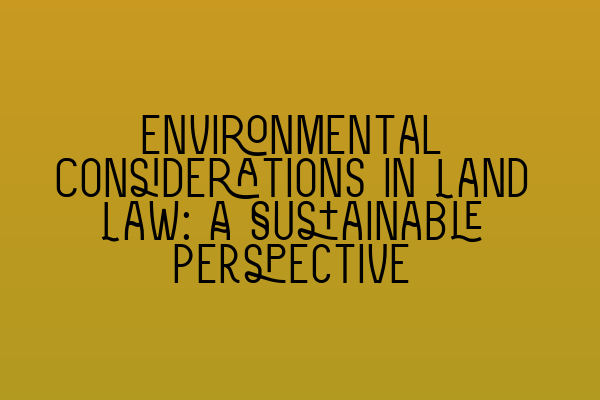Environmental Considerations in Land Law: A Sustainable Perspective
Welcome to another informative blog post by SQE Property Law & Land Law. Today, we will be delving into the topic of environmental considerations in land law from a sustainable perspective. As society becomes more aware of the importance of sustainable development and environmental protection, it is crucial for property law professionals to understand the implications of environmental laws on land transactions and ownership.
Before we delve into the topic, let’s clarify what we mean by environmental considerations in land law. Environmental considerations refer to the legal and regulatory measures that aim to protect the environment, conserve natural resources, and mitigate the impact of human activities on the ecosystem. Land law, on the other hand, governs the rights, responsibilities, and transactions related to land ownership and use.
The Importance of Environmental Considerations in Land Law
With climate change, pollution, and habitat destruction becoming pressing global issues, environmental considerations are increasingly influencing land law. Governments, organizations, and individuals are recognizing the need to protect and sustainably manage the land to ensure the well-being of current and future generations.
Incorporating environmental considerations into land law helps prevent environmental degradation, supports sustainable development, and ensures compliance with environmental regulations. It is crucial for anyone involved in land transactions, whether as a buyer, seller, or solicitor, to be aware of these considerations and their legal implications.
Environmentally Protected Areas
One of the key components of environmental considerations in land law is the designation and protection of environmentally sensitive areas. These areas may include national parks, conservation areas, areas of outstanding natural beauty, or environmentally protected sites.
When dealing with land located within such areas, it is essential to understand the specific regulations and restrictions that apply. For example, there may be limitations on the type of development allowed, restrictions on the use of certain materials, or requirements for environmental impact assessments.
By being aware of these regulations, solicitors can guide their clients through the legal process, ensuring compliance and minimizing the risk of legal disputes or penalties.
Environmental Due Diligence
When engaging in land transactions, conducting thorough environmental due diligence is essential. Environmental due diligence involves assessing the potential environmental risks and liabilities associated with a property.
This process helps identify any contamination issues, assess the potential impact on the environment, and estimate the costs and responsibilities associated with remediation. It is vital for both buyers and sellers to conduct environmental due diligence to ensure transparency and protect their interests.
As a solicitor, facilitating environmental due diligence becomes crucial as it helps clients make informed decisions and avoid future legal complications. By working with environmental consultants and experts, solicitors can provide valuable insights and guidance on complying with environmental regulations.
Mitigating Environmental Risks
As advocates for sustainable development, solicitors can also play a crucial role in helping clients mitigate environmental risks. This includes advising on the implementation of eco-friendly practices, supporting the use of sustainable materials, and promoting environmentally responsible development.
Incorporating sustainability clauses in lease agreements or contract terms can reinforce the commitment to environmentally friendly practices and, in some cases, provide tangible benefits such as reduced energy costs or tax incentives.
Moreover, keeping up-to-date with the latest environmental regulations and best practices enables solicitors to better represent their clients’ interests and recommend sustainable land-use strategies.
The Future of Environmental Considerations in Land Law
As the global community grapples with the challenges of climate change, biodiversity loss, and resource depletion, environmental considerations will continue to shape land law. Governments and regulatory bodies will likely introduce stricter regulations to ensure sustainable land use, promote renewable energy, and reduce carbon emissions.
As a property law professional, staying informed about these developments will be essential to provide effective legal advice to your clients.
In conclusion, environmental considerations in land law are of paramount importance in today’s world. By integrating environmental concerns into land transactions, solicitors can support sustainable development, minimize ecological harm, and protect their clients’ interests. As legal professionals, let us embrace our role in championing sustainable practices and ensuring a future where land management goes hand in hand with environmental preservation.
For more information on related topics, please check out the following articles:
